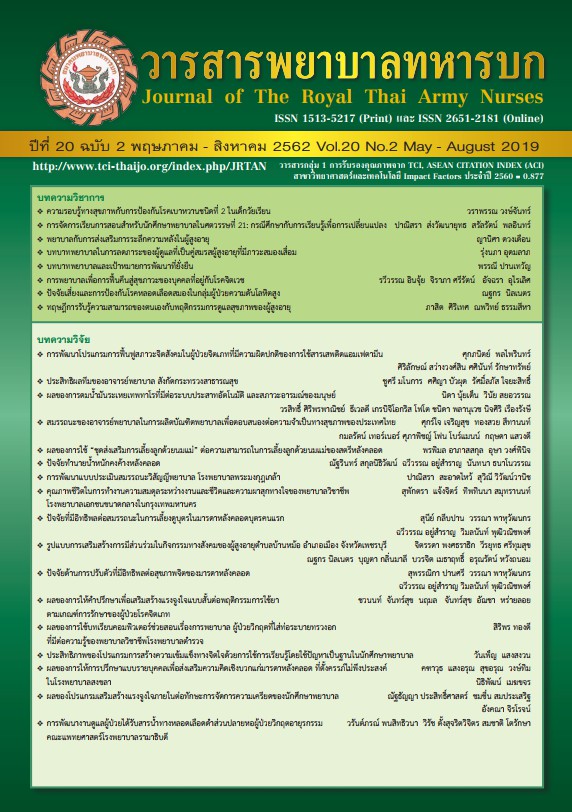Team Effectiveness of Nursing Instructors under The Ministry of Public Health
Abstract
The research was quantitative research to study the team effectiveness of nursing instructors under the Ministry of Public Health. A sample of 325 was randomly selected from nursing instructors under the Ministry of Public Health. The research instrument was a questionnaire which used to collect data were (i) a personal information questionnaire; (ii) an opinion of emotional intelligence and individual characteristics; (iii) an opinion of servant leadership; and (iv) an opinion of team effectiveness. The data were analyzed using descriptive statistics. Findings revealed that team effectiveness of nursing instructors under the Ministry of Public Health was a high level ( = 4.14). The team relationships and team problem-solving were highest level (
= 4.20), and team members, team leader, and organizational environment (
= 4.19, 4.14, 3.88 respectively).
Downloads
References
2. Komutikanon S. A Study Actual States and Expectation of Team Working as Reported by Health Team in the Hospitals under the Jurisdiction of Department of Medical Services, Bangkok Metropolitan Administration. Degree of Master of Nursing Science Program in Nursing Administration. Faculty of Nursing Chulalongkorn University. 1993. (in Thai)
3. Austin A.E.; and Baldwin R.G. Faculty Collaboration: Enhancing the Quality of Scholarship and Teaching. Washington D.C. The George Washington D.C. School of Education and Human Development. 1991.
4. Jankaew I. Desirable Leadership Characteristics of Royal Thai Army Officers at the Signal Department. Degree of Master of Business Administration, Rangsit University. 2012. (in Thai)
5. Kangpeng S.; and Kanlong S. The Leadership in Service Organization: Concept Principle and Research. Press 2nd. Khonkaen. 2010.
6. Spears L.C. The Understanding and Practice of Servant-Leadership. School of Leadership Studies. Regent University. 2005.
7. Anderson K.P. A Correlational Analysis of Servant Leadership and Job Satisfaction in A Religious Educational Organization. Dissertation for the Degree of Doctor of Management in Organizational Leadership. University of Phoenix. 2005.
8. Saraketrin A.; et al. Nursing Education in the 21st Century: Competencies and Roles of Nursing Instructors. Journal of the Royal Thai Army Nurses. 2019; 20(1), 12-20. (in Thai)
9. Rattanapitikon D. Predictive Factors of Professional Nurses’ Job Retention at Phyathai Hospital. Degree of Master of Nursing Science (Nursing Administration), Sukhothai Thammathirat Open University. 2009. (in Thai)
10. Goleman D. Emotional Intelligence: Perspectives on a Theory of Performance. In:Cherniss C, Daniel Goleman, editors. The Emotionally Intelligent Work place. San Francisco: Jossey-Bass. 2001.
11. Dierendonck D.V. Servant Leadership: A Review and Synthesis. Journal of Management. 2011; 37(4), 1228-1261.
12. Patterson K.A. Servant Leadership: A Theoretical Model. Dissertation Abstracts International, 2003; 64(2), 570.
13. LaFasto F.; and Larson C. When Team Work Best: 6,000 Teams Members and Leaders Tell What It Takes to Succeed. Thousand Oaks, CA: Sage. 2002.
14. Yamane T. Statistic: An Introductory Analysis. 3rd ed. New York: Harper & Row. 1973.
15. Dennis R.S.; and Bocarnea M.C. Development of the Servant Leadership Assessment Instrument. Leadership & Organization Development Journal. 2005; 26(8), 600-615.
16. Manokarn C. A Factor Analysis of Healthy Work Environment of Professional Nurses. Degree of Master of Nursing Science Program in Nursing Administration, Faculty of Nursing Chulalongkorn University. 2005. (in Thai)
17. Romig D.A. Breakthrough Teamwork: Out Standing Result Structure Teamwork. Chicago: Irwin. 1996.
18. Suthitakpaibun K. The Effect of Nursing Team Work Development Model Based on the Concept of Romico on Work Happiness of Professional Nurses. Buddhachinaraj Medical Journal. 2014; 31(2), 134-143. (in Thai)
19. Buerangae P. Teamwork that Effected Working Environment in the Organization: Case Study of the Government Lottery Office. General Management, Rajamangala University of Technology Thanyaburi. 2011. (in Thai)
Downloads
Published
How to Cite
Issue
Section
License
บทความหรือข้อคิดเห็นใดใดที่ปรากฏในวารสารพยาบาลทหารบกเป็นวรรณกรรมของผู้เขียน ซึ่งบรรณาธิการหรือสมาคมพยาบาลทหารบก ไม่จำเป็นต้องเห็นด้วย
บทความที่ได้รับการตีพิมพ์เป็นลิขสิทธิ์ของวารสารพยาบาลทหารบก
The ideas and opinions expressed in the Journal of The Royal Thai Army Nurses are those of the authors and not necessarily those
of the editor or Royal Thai Army Nurses Association.






